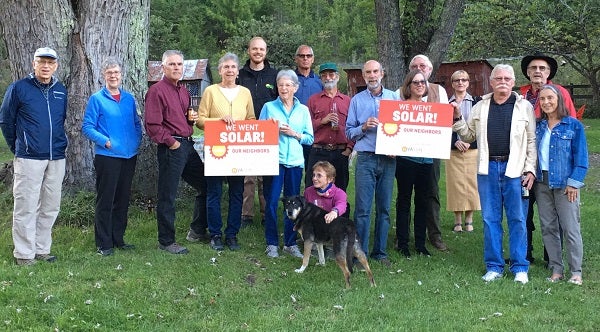Solar supporters make presence felt at Rubin Group meeting

Over the past two years, a collection of Virginia energy stakeholders has met to make policy recommendations to the Virginia General Assembly regarding rules and regulations for solar. Known as the Rubin Group after its moderator, attorney Mark Rubin, these stakeholders include utilities, solar industry representatives, environmental advocates, and others. Last year, the group’s discussion sessions helped to produce three solar-related bills that were signed into law. The group met again earlier this month to solicit public feedback for solar policy proposals to be presented in the next legislative session. This meeting was different than previous ones because of the powerful voice and presence of Virginia’s community of solar supporters.
Meeting recap
More than 60 solar advocates attended the meeting. An additional 30 joined by phone. Members of the VA SUN network representing all areas of the Commonwealth echoed a strong voice that customer-owned solar options for homes, businesses, and municipal entities must be supported as part of any Rubin Group recommendations. This opportunity for discussion set a good path forward for this goal, but this is only the first step.
In person and phone attendees echoed key questions which remain:
- Are solar ratepayers, a key constituency, adequately represented in this process?
- How does the group measure success?
- Do the group’s final recommendations lead to legislation that increases distributed solar generation (like rooftop solar)?
- Does the group lean too much towards utility and large scale development interests at the expense of rooftoop solar?
The topic that garnered the most interest from the group was net metering. Solar homeowners and businesses insisted upon the importance of expanding options to net metering while removing red tape and ensuring that Virginians get a fair value for the energy they produce with solar. Installers from all over the commonwealth noted that their ability to provide well-paying jobs depends on net metering.
Solar options for all communities
Solar advocates also expressed a strong desire for real community solar. Real community solar allows individuals and businesses in a community to develop and own a share of a single solar project and benefit proportionally. This is still illegal in Virginia and many at the meeting made it clear that utility-owned solar subscription programs passed off as ‘community solar’ are insufficient and not really ‘community solar’.
It was clear from the meeting that attendees want to create an electric system that enables all communities to participate and benefit from their own energy production. Utility stakeholders agreed that they are in a position to facilitate this change. The utilities have two options. They can continue to use their financial and political resources to block solar options for the customers they serve. Or, they can take a leadership role in facilitating the clean and participatory energy grid their customers want.
How you can bring more solar to Virginia
This meeting is a good first step towards expanding solar access in Virginia. Our community of solar supporters is proving we can take an active role to expand access to net metering, make real community solar legal in Virginia, allow for solar leasing, and remove the barriers to red tape to customer-owned solar options.
The Rubin Group is opening their stakeholder process by holding subsequent meetings and creating several topic-area working groups. Solar supporters interested in this effort should:
- Volunteer to be on one of four working groups focusing on net metering, community solar, land use, and large-scale utility solar. To get involved, email: Rubingroup2017@gmail.com and indicate the working group you would like to join.
- Demand that group hold stakeholder meetings across Virginia (especially in southwest Virginia) by emailing Rubingroup2017@gmail.com and ask them to hold a meeting where you live.
